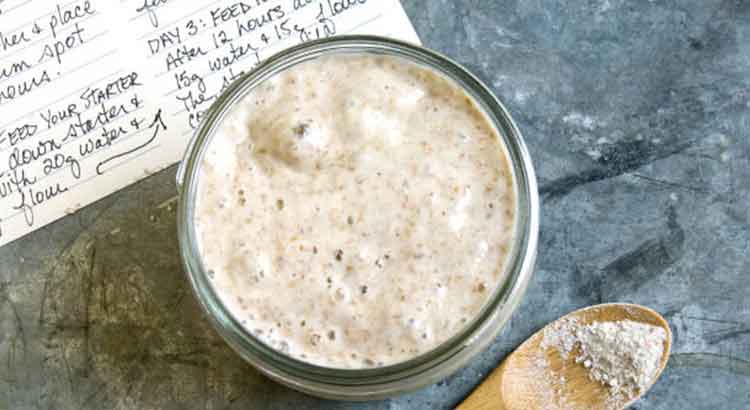Do you love baking bread but wonder if using organic flour really makes a difference?
The advantages of using organic flour when making sourdough are: it tends to have a higher nutrient content, fewer synthetic additives, and is often milled from higher quality wheat. This can result in a more flavorful and wholesome loaf.
If you’re curious about how this simple swap can elevate your sourdough game, you’re in for a treat! We’ll break down the benefits and explore why organic flour might just be the secret ingredient your sourdough has been missing. From better flavor to a healthier option, there’s more to discover about this humble pantry staple. Let’s dive in!
Why Organic Flour Is Better
Organic flour may not be a necessity for sourdough, but it certainly brings a host of benefits to the table. Let’s take a closer look at why opting for organic flour can make a significant difference in your sourdough baking experience.
Nutrient Rich Goodness
One of the key advantages of using organic flour is its higher nutrient content. Unlike conventionally grown wheat, which is often treated with synthetic fertilizers, organic wheat is nurtured through natural, nutrient-rich soil. This means that the flour derived from organic wheat contains more essential vitamins and minerals, resulting in a healthier and more nourishing loaf of sourdough.
Fewer Additives, Purer Flavor
When you choose organic flour, you’re steering clear of a myriad of synthetic additives and chemicals that can find their way into conventionally produced flour. Organic farming practices prioritize minimal intervention, meaning you’re getting a purer, unadulterated flour. This purity translates into a cleaner, more distinct flavor profile in your sourdough, allowing the natural taste of the wheat to shine through.
Quality Wheat, Quality Loaf
Organic wheat tends to be of higher quality compared to its conventionally grown counterpart. This is because organic farmers focus on cultivating varieties that are well-suited to their specific environment and climate. The result is a more robust and flavorful grain, which in turn produces a more satisfying and delicious loaf of sourdough.
Environmentally Conscious Choice
Opting for organic flour is not only beneficial for your sourdough, but also for the environment. Organic farming practices prioritize sustainability and aim to minimize harm to the ecosystem. By choosing organic flour, you’re supporting a farming method that promotes healthy soil, conserves water, and reduces pollution. It’s a small step towards a more sustainable and eco-friendly food system.
A Personal Touch to Your Sourdough
Baking sourdough is an art form, and the choice of flour plays a pivotal role in this creative process. Organic flour adds a personal touch to your sourdough, reflecting your commitment to quality, health, and the environment. It’s a simple yet impactful way to infuse your sourdough with a little extra care and consideration.
Things to Take Into Consideration
Flour Types Matter
When it comes to choosing organic flour for your sourdough, consider the type of wheat used. Whole wheat flour provides a nuttier, heartier flavor, while all-purpose flour yields a milder taste. Experiment with different varieties to find the one that suits your palate and desired outcome best.
Check for Certifications
Not all products labeled as “organic” are created equal. Look for certifications from reputable organic standards organizations. These certifications ensure that the flour meets specific criteria for organic production, guaranteeing a higher quality product.
Freshness Counts
Opt for recently milled organic flour whenever possible. Freshly milled flour retains more of its natural oils and nutrients, resulting in a more flavorful and nutritious sourdough. Check the packaging for the milling date or buy from a trusted supplier known for their quality organic products.
Mind Your Budget
While organic flour offers numerous benefits, it may come with a slightly higher price tag. Consider your budget and how often you bake sourdough. If it’s a regular part of your routine, investing in organic flour could be a worthwhile choice for both taste and health.
Additional Tips
Store with Care
To preserve the freshness and quality of your organic flour, store it in an airtight container in a cool, dark place. This helps prevent exposure to air and light, which can lead to the degradation of flavor and nutrients.
Experiment and Adjust
Every flour, whether organic or not, has its unique characteristics. Don’t be afraid to experiment with different brands and types to find what works best for your sourdough recipe. Adjust hydration levels and fermentation times accordingly to achieve the desired texture and flavor.
Blend for Balance
If you’re easing into the world of organic flour, consider blending it with your regular flour in the initial stages. This allows you to gradually transition while still reaping some of the benefits of organic flour in your sourdough.
Respect the Process
Remember, baking sourdough is as much about the process as it is about the ingredients. Take your time, observe the dough, and let it develop its flavors naturally. The use of organic flour adds an extra layer of care to this journey, resulting in a more wholesome and satisfying loaf.
Final Thoughts
In the world of sourdough baking, the choice of flour is a topic that often sparks curiosity and debate. While organic flour isn’t a strict requirement, it brings a host of advantages to the table. The higher nutrient content, absence of synthetic additives, and superior quality of organic wheat contribute to a more flavorful and wholesome loaf. This simple switch can elevate your sourdough game, providing a nourishing option for both your taste buds and your body.
Considerations like flour type, certifications, freshness, and budget play a crucial role in making an informed choice. Each factor contributes to the overall quality and taste of your sourdough. Opting for freshly milled, certified organic flour ensures that you’re getting the best possible product. While it may come with a slightly higher price tag, the investment in your health and the environment is well worth it for many baking enthusiasts.
Remember, baking sourdough is an art form that involves patience, observation, and a touch of creativity. Choosing organic flour adds a personal touch to this process, reflecting your commitment to quality and well-being. Whether you’re a seasoned baker or just starting out, incorporating organic flour into your sourdough routine is a small yet meaningful step towards a more nourishing and sustainable baking experience. Happy baking, and may your loaves be filled with wholesome goodness!
FAQ
Q: Is organic flour more expensive than regular flour?
A: Yes, organic flour tends to be slightly pricier than its conventional counterpart. This price difference is attributed to the higher cost of organic farming practices, which prioritize sustainable and natural methods. While it may require a bit more from your wallet, many find the investment in health and quality well worth it.
Q: Can I substitute regular flour with organic flour in any recipe?
A: Absolutely! You can seamlessly swap regular flour with organic flour in most recipes without any major adjustments. Whether you’re making bread, pastries, or pancakes, using organic flour will enhance the flavor and nutrition of your creations. Just keep in mind that the type of flour (whole wheat, all-purpose, etc.) may affect the texture and taste, so feel free to experiment to find what works best for you.
Q: Does organic flour have a different texture compared to regular flour?
A: The texture of organic flour can vary depending on the type and milling process. Whole wheat organic flour tends to be coarser due to the inclusion of the entire wheat kernel. On the other hand, organic all-purpose flour typically has a finer texture similar to conventional all-purpose flour. It’s always a good idea to familiarize yourself with the specific characteristics of the organic flour you choose to ensure it aligns with your desired outcome.
Q: Does organic flour have a shorter shelf life compared to regular flour?
A: Organic flour, especially freshly milled varieties, may have a slightly shorter shelf life compared to highly processed, commercial flours. This is because it retains more natural oils and nutrients, which can lead to quicker spoilage if not stored properly. To maximize its freshness, store organic flour in an airtight container in a cool, dark place.
Q: Can I find organic flour at my local grocery store?
A: Yes, most major grocery stores now carry a variety of organic products, including organic flour. Look for it in the baking aisle or in the organic foods section. If you’re looking for a wider selection or specialty types of organic flour, you may want to check with local health food stores or specialty food markets.
Q: Are there any specific certifications I should look for when buying organic flour?
A: Yes, when purchasing organic flour, it’s advisable to look for recognized certifications from reputable organic standards organizations. Common certifications in the United States include the USDA Organic label and certifications from organizations like Oregon Tilth and QAI. These certifications ensure that the flour meets specific criteria for organic production.
Q: Can I use organic flour for gluten-free baking?
A: No, organic flour is made from wheat and contains gluten, which is a protein found in wheat, barley, and rye. If you require gluten-free options, consider using alternative flours like almond flour, coconut flour, or gluten-free flour blends specifically designed for those with gluten sensitivities.
Q: Does using organic flour make a noticeable difference in the taste of my baked goods?
A: Yes, using organic flour can lead to a more distinct and flavorful outcome in your baked goods. The absence of synthetic additives and the higher quality of organic wheat contribute to a purer, more robust taste. Many bakers find that organic flour enhances the overall experience of their creations, whether it’s bread, cakes, or other baked treats.

